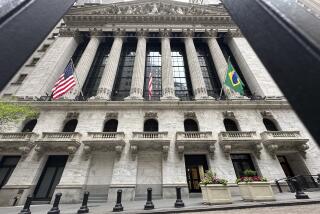Investors Thinking Small--as in OTC
- Share via
Every time the over-the-counter stock market rallies with any conviction, untold numbers of analysts hold their breath and wonder: Could this finally be it --the start of small stocks’ climb out of their eight-year depression?
During the past two weeks, small stocks have jumped significantly as investors have shaken off their worst fears about the Persian Gulf War. The National Assn. of Securities Dealers’ composite index of over-the-counter stocks is up 10.3% since Jan. 15.
In contrast, the Dow Jones industrial average, measuring the biggest of the big stocks, is up 6.8%.
It isn’t unusual for small OTC stocks to briefly lead a turn in the market. By their very nature, smaller stocks are more volatile, falling more sharply than big stocks in down markets and gaining faster at the outset of up markets.
But the small stocks’ overall performance since 1983 has been awful. Investors have increasingly forsaken these stocks for those of blue chip companies. The indexes tell the story:
* The Dow average, at 2,659.41 on Friday, is up 107% from its 1983 high.
* The NASD OTC composite, at 394.28 on Friday, is up just 20% from its 1983 high.
In theory, that should mean that bargains abound in the OTC arena. But, then, that’s what analysts have tried to persuade investors for eight years. Yet rarely in that time has a broad rally lasted longer than a few months.
So what do the experts make of the latest rally? It could be just wishful thinking, but some traders say institutional investors are displaying more genuine interest in small stocks than they have in a long time.
“There’s a willingness to step up and buy these stocks without being cute about it,” says William Rothe, chief OTC trader at Alex. Brown & Sons in Baltimore. Last year, potential buyers would constantly try to talk prices down, putting sellers through the wringer, Rothe says. Now, buyers are much more willing to pay sellers’ asking prices or more, he says.
Jack Tierney, OTC trader at Jefferies & Co. in Dallas, agrees that “any selling now is met with a substantial interest on the buy side by institutions. It’s been very impressive, as far as the strength goes, especially in the technology area.”
It could well be, say some analysts, that the deep declines in small stock prices last year and early this year represented a final “washing out”--that almost everyone who wanted to sell, sold, no matter how little they got for their shares.
Indeed, in the first two weeks of this year, as the deadline for war in the Persian Gulf approached, many individual investors seemed to be throwing out the last of their OTC dogs. An NASD index of Los Angeles-area OTC stocks was particularly hard-hit, falling 4.8% from Jan. 1 through Jan. 10, versus a 3% drop in the OTC composite index.
Since the war began, many Southland OTC stocks have been bid up strongly, along with the rest of the OTC universe. And individual investors have again become active buyers, some apparently looking ahead to the end of this recession and a new period of economic growth--and corporate earnings growth--late this year or in 1992, traders say.
“They’re finally coming after the small stocks,” says Larry Rice, chief OTC trader at Wedbush Morgan Securities in Los Angeles. What’s more, “the buying interest is being shown in many more companies” than in previous OTC rallies, he contends.
Rice figures that many individual investors who owned OTC issues in the 1980s have probably kept an eye on their former stocks, even if they sold them long ago. That’s human nature, of course. You’re always curious to know how much you might have lost, or gained, if you had held on. With prices of many OTC stocks at their lowest levels since the late 1980s, individual investors who were once in the stocks may be newly intrigued with their potential, analysts say.
If that’s true--and if it continues for more than just a few weeks--the odds may increase that small stocks will see a bona fide renaissance when it is clear the economy is bottoming. The OTC market badly needs the individual investor, perhaps even more than it needs institutions. “Retail investors will have to come into the market to sustain any move,” Rothe says.
Are small stocks worth a look? As depressed as they still are, the answer is yes. But every investor must decide ahead of time whether to play these stocks as trading vehicles or as long-term investments. When the stocks start to move, they can take off like rockets, because there are so few shares for sale after their long declines. As difficult as it was for investors to sell these stocks in 1990, it may become just as difficult to buy them in 1991.
WHERE THE ACTION IS Small-stock indexes have led the market rally since the Persian Gulf War began.
Percentage change: Index 1989 1990 Since Jan. 15 H&Q;* growth-tech +17.4% +3.9% +18.0% NASD OTC industrials +18.2% -9.4% +11.7% NASD OTC composite +19.3% -17.8% +10.3% S&P; 500 +27.3% -6.6% +7.1% Dow industrials +27.0% -4.3% +6.8% NYSE composite +24.8% -7.5% +6.8% Amex market value +23.5% -18.5% +3.7%
* Hambrecht & Quist
More to Read
Inside the business of entertainment
The Wide Shot brings you news, analysis and insights on everything from streaming wars to production — and what it all means for the future.
You may occasionally receive promotional content from the Los Angeles Times.










